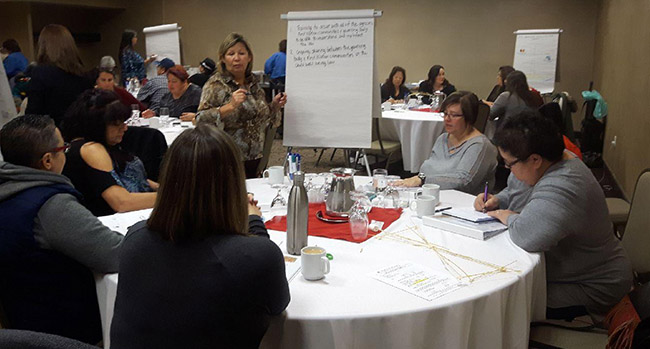‘Koganaasawin’ new name for Anishinabek Nation Child Well-Being system

By Stan Cloud
Koganaasawin is the new name that has been given through ceremony to the Anishinabek Nation’s child well-being system that will support the implementation of Child Well-Being Law that has been under development since 2007. Last April, Social Services Director Adrienne Pelletier offered tobacco to Elder Gordon Waindubence to seek a name for the new child well-being system.
A strategic planning session for Koganaasawin was held in Sault Ste. Marie on November 7-9. The participants were a good representation of front line workers, band representatives, council social portfolios, pre-mandated and mandated agencies workers that have sound knowledge of the needs of families from all areas of Anishinabek territory. The participants were involved in a variety of activities designed to inform the process moving forward and to ensure that the work completed to date, is still what the citizens envisioned and support.
Some strong messages came forward about the determination of our citizens and the partnerships that are critical to ensure our families in urban centres receive the help they need. As much as, First Nations want to be right beside their citizens walking with them and supporting them, where and whenever they are at risk of becoming involved in the provincial child welfare system, at times it is not possible. The reality is that it is not possible because of under funding and the inequity that exists in Ontario and Canada, as pointed out in the Canadian Human Rights Tribunal decision.
An area of common concern is the issue of mixed marriages, and how do we make sure families’ cultural identity is respected during this process. It is critically important that the children involved not be denied access to services that are culturally based, simply because one parent is not Anishinaabe. Far too often our citizens that were lost in the child welfare system speak of the feeling of something missing in their life. The answer is connection to their indigenous identity and community. We must do everything possible to not let this happen to anymore of our citizens.
Moving forward the focus will be on ensuring the work is entrenched in Anishinaabe values and communication efforts will increase to promote awareness among our citizens. The participants were very clear and united on promoting the importance of Anishinaabe identity, culture, and land-based activities be offered to families. Supports based on Anishinabek community values and traditions will be far more helpful to families then mainstream services.
The session closed out with identifying how should Koganaasawin relate to the province, Canada, and our First Nations and licensed agencies. It was clear that Koganaasawin should establish a strong position based on inherent jurisdiction, this will support the development of Anishinabek value based services. A renewed relationship with our First Nations and agencies will take place to ensure that the expertise of our citizens will help shape the services. It will also ensure clear, complete and accurate information is reaching our citizens and the agencies.

